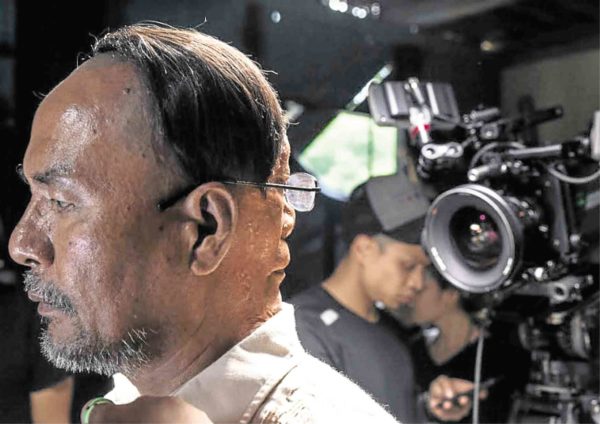All we need is Lav—Lav Diaz, that is.
In these troubling times, the revered filmmaker’s latest four-hour epic (a musical!), “Ang Panahon ng Halimaw,” sounds like a clarion call.
For serious cineastes, it is nothing short of revolutionary that “Halimaw” opens a week after Mike de Leon’s “Citizen Jake”—another scathing critique of the bitter legacy of the martial law regime. “Halimaw” opens in select Ayala Cinemas tomorrow.
With the help of the interweb, Lav, who is in New York (where he is taking care of his two grandchildren, including a 3-week-old baby), sends poetic, passionate answers to a few questions posed by the Inquirer.
What are your thoughts as “Halimaw” begins its theatrical run? We are grateful that it will be shown in a few Ayala Cinemas. Ayaw magpalabas ng ilang malls at sinehan dahil may kinatatakutan sila o kinikilingan, at dahil black and white, at dahil lampas tatlong oras ’yung pelikula. Pero ang laking tuwa na namin dahil nangako si Manang Memang, isang payak na sastre, na manonood siya pagsara ng kanyang haberdashery.
Why is it important for Filipinos to watch this film, in light of the crisis on the streets, in the Supreme Court, in the Philippine seas? Makikita nila ang kasagutan sa film ’pag nanood sila.
What is the role of artists in a time of discontent, discord and divisiveness? The filmmaker must make responsible cinema. The Filipino poet must write words that will nurture the Filipino soul. Kailangang gumalaw ang alagad ng sining ng ayon sa mga katotohanang nagaganap sa kanyang kasalukuyan. Kailangang gumawa siya ng mga obrang kritikal sa kanyang kasalukuyan. The artist must create works that mirror the urgent [issues] of his time.
Why do we need to keep reminding people of the horrors of martial law? I rode a tricycle recently and the driver told me, “Mabuti pa noong martial law, ang payapa ng Pilipinas, ang ganda ng Pilipinas.” One Uber driver told me: “Pinakamagandang panahon ang martial law. Ang yaman ng Pilipinas noon.” Another Uber driver said: “Walang krimen noong panahon ni Marcos.”
Another Uber driver told me, “Sundalo ako noong martial law. Wala kaming tinorture; wala kaming pinatay. Hindi totoong may mga nawala; gawa-gawa lang ng dilawan ’yan.” I asked for his age, and he said 26 (sumakit ang ulo ko). A taxi driver declared: “Pinakadakilang pangulo si Marcos. P***ng i***g mga dilawan ’yan! Puro sila paninira!”
Just walk the streets all over the country, talk to our people and you’d weep when you
realize the magnitude of ignorance. Ang lalim na ng nagawa ng rebisyunismo at kasinungalingan. Ang lalim na ng desekrasyon ng ating kultura. Biro mo, paggising ni Manang Memang, ang payak na sastre, iniluklok na nila sa Libingan ng mga Bayani ang demonyo.
On the set of “Halimaw,” with Piolo Pascual (left), cinematographer Larry Manda (fourth from left), Bituin Escalante (fifth from left) and Lav Diaz (right) —Giovanni D’Onofrio
What is your message to millennials who may feel disconnected from the people’s suffering during the martial law era? They should study our history. Earnestly.
Who are the “Halimaws” of our time? Is it just metaphorical, or is it a living, breathing monster? Ang paggamit ng metapora ay isang pamamaraan lamang ng pagsasalamin sa mga katotohanan ng ating paligid.
Kilala natin (o kilalanin) ang mga halimaw, noon at ngayon, ng pakikibakang kultural ng bayan—ang halimaw ng kolonyalismo, ang halimaw ng pasismo, ang halimaw ng kamangmangan, ang halimaw ng kabastusan, ang halimaw ng misohinismo, ang halimaw ng pananakot, ang halimaw ng karahasan at pamamaslang, ang halimaw ng pagwawalang-bahala at pagpapabaya, ang halimaw ng kasinungalingan, ang halimaw ng pagbubulag-bulagan, ang halimaw ng mga mitong likhang-tao, ang halimaw ng demagoga, ang halimaw ng mga bulaang propeta at ang halimaw ng sistema ng kabulukan. Ang mga halimaw na ito ang ngumangatngat sa kaluluwa ng bayan.
What is music’s role in society? Is it a mere expression of emotion or a subversion of emotion? Music as protest or as propaganda? Remember the “Bagong Lipunan” jingle? Music is the language of man’s soul. It is the only medium where we can truly reach our deepest emotions. A melody that touches us can open a repository of memories. A hymn can transport us to plains we cannot traverse physically. A note can decode doors unknown to us. Music is the most mystical and spiritual among the arts. The “Bagong Lipunan” jingle is not music; it’s poison.
What’s your take on filmmakers who become purveyors of propaganda? Malaya silang magpahayag ng saloobin nila, ng pagkiling nila, pero sana maging responsable sila. Pag-isipan sana nilang mabuti ang kanilang ginagawa.
How can we defeat the “Halimaws” of our time? We engage them—with dignity and courage.
Is there still hope for our poor country? Oo naman. Manatili tayong maging mapanuri.
Huwag tayong padaig sa kabulaanan. Huwag tayong malulugmok sa takot. Huwag tayong maliligaw sa dilim.
